Roofing Road Trip with Heidi- Wayne Altizer PODCAST TRANSCRIPTION
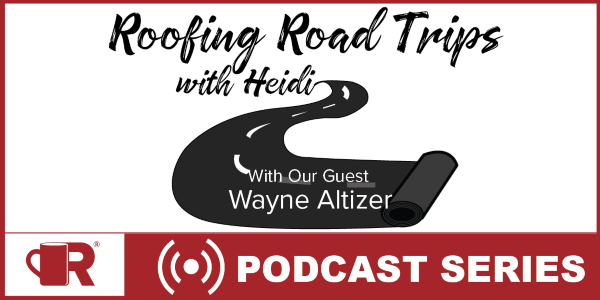
Editor's note: The following is the transcript of an interview with Wayne Altizer from Topps Products Inc. You can read the interview below or listen to the podcast here.
Heidi: Hello, welcome to Roofing Road Trips with Heidi, part of Roofer's Coffee Shop, our read, listen, watch program where you can listen, you can read, you can watch, you can learn any way that you want. The Roofing Road Trip Podcast today, I'm very excited to welcome Wayne Altizer, Vice President of Topps Products. Wayne and I've been working together now for a little while and have gotten to know each other and so I invited him here on the show to tell us a little bit about what's happening with roof coatings. It's so hot and everybody wants to know, and so Wayne's going to share with us some stuff on roof coatings and just the industry overall and a little bit about Topps Products. So Wayne, welcome to the show.
Wayne Altizer: Thank you, Heidi. Glad to be here.
Heidi: Yeah, I'm so happy to have you today. It's nice to be able to just have these conversations and share them because I get to hear from you guys all the time, all the great things you're doing, but it's nice to be able to share that out.
Wayne Altizer: Absolutely. Absolutely.
Heidi: So, okay, let's just dive right in. Wayne, what are you seeing in the industry concerning roof coatings? What's hot? What's happening? What's the buzz on the roof coatings front?
Wayne Altizer: Well, the buzz really is, it's growth. There is a tremendous amount of growth in coatings and that's been going on for several years now. It seems to be being driven by a comfort level. It seems that both contractors and building owners are becoming more comfortable and understanding what a high performance roof coating can actually do for them. They're seeing that it's a viable alternative. It's not just paint like it was in years past. They're seeing that they can get the same quality roof as they normally would with say a membrane for example, without the expense, the waste, the disruption of business, everything that goes along with the tear off. The comfort level in that regard is just driving the growth behind it.
Heidi: Yeah. We also hear about just when we're looking at this new generation coming up, the importance of the environment and sustainability and what you're saying there is the ability to just code something instead of putting it into, coat with a really good roofing system instead of putting it into landfills, that's going to be huge.
Wayne Altizer: Yes, it is. Yes, it is. Speaking to that, there's no reason to add the waste to the landfills. When you've got a membrane that's nearing the end of its service life, instead of just throwing it away, like in years past, you're 100% right. You go up and you coat it and you essentially get another 10 to 20 years of service life out of that membrane that would normally just be rotting in a landfill.
Heidi: What we're seeing along with roof coatings, the other really hot trend in roofing right now is service and maintenance departments with the roofing contractors and they're able to extend the life of these roofs even further than that with the service and the maintenance and the coatings products that really Topps is known for.
Wayne Altizer: I think that's one of the most overlooked areas in roofing, in roofing in general, not just in coatings, but in the entire industry is the maintenance aspect of it. A successful contractor will sell a maintenance program to the building owner for the life of the roof he's putting on and it has so many benefits, not only to the building owner, but also to the contractor. The contractor is able to provide a solid quality product that he can stand behind. He's going to be on that roof making money every year, fixing small issues before they become large issues. Most importantly, he's in front of that building owner at least once a year. So most, not most, but a lot of building owners own multiple properties. When it comes time to fix a problem on another property, who's he going to call? He's going to call the guy that's been taking care of him for the past five, six, seven years. When his friend needs a referral, who's he going to call? The roofer that's been taken care of him. So it's really a no brainer. The contractor makes good money on it and he's able to increase his networking abilities while making money.
Heidi: Yeah. We just finished up a podcast yesterday with Michelle Boykin from Rackley Roofing and she's one of our RCS influencers, and they have I think she said yesterday, 23 service trucks now and they started out with like one just a couple of years ago. The demand for service and the ability for these contractors to, like you said, really have sustainable and scalable business with their building owners long term, it's huge.
Wayne Altizer: It is. It's really huge and it's very often overlooked and that's a shame because it's a great source of not only present income but future income for the contractors and it gives the building owner peace of mind. He's getting what he paid for.
Heidi: It's so true. Following up on that, both on the service and the sustainability or even the kindness to the environment, how do you help your contractors with the messaging to building owners on really how to talk about that? How to talk about a roof coating system that can really be good for the environment and good for their building and good for their budget and the importance of ongoing service with that to kind of continue that sustainability message. How are you positioning that?
Wayne Altizer: Every time we do a training with the contractors, that is brought up, the maintenance aspect of it because at least in my opinion, it is so overlooked. Your more successful contractors, they get it. They know that that is easy money and it's worth its weight in gold. It's your smaller guys that tend to overlook it. So when we do trainings to certify our contractors, we absolutely dive into that. It's the business aspect of the training that we provide to them.
Heidi: Yeah. That's what's so important. I think is how to use the right products, roofing products on the roof and being able to have really that strong service for the building owners with the right products. The contractors are getting that. I'm glad to hear that that's part of all of your trainings. Talk to us just a little bit about Topps Products. It's a 30-year-old company. I know there's new ownership. Can you tell us a little bit about what's going on there?
Wayne Altizer: Sure. We were able to purchase the company last year or year before last now, 2018, and what we've done is it's been a pretty seamless transition. The previous owners were ready to retire. They were well up in age and we were able to retain all of our employees, which is almost unheard of for a transition like this. But everybody seemed to be really excited about fresh new ideas and having their voice heard and being able to dive into market segments that had not been ignored, but the emphasis hadn't been placed on them in the past. And getting these fresh ideas and that the employees have been wanting to share and have been trying to share for so long and finally getting some action behind them has really just refreshed everything. Everybody's gotten a reboot out of it, if you will.
Heidi: Isn't not what we're all talking about nowadays is culture in the companies? Obviously labor shortage, but how do you keep your talented, how do you retain those talented employees? It sounds like you've really been able to put that together.
Wayne Altizer: We have. We have, and we're pretty proud of that. Retaining your talent from a business owner's perspective is so much more positive than having to try to go out and recruit new talent. Our turnover rate is almost nil. Our employees stay with us for decades and that's fantastic from our standpoint. But we do, we work really hard to keep them happy and listen to their concerns and when they're valid, we put action behind it and we do it quickly. That's one of the benefits of not having your huge culprit or corporate structure behind you. You're able to put things into practice very, very quickly.
Heidi: Well, you and I were just talking about it, for those listening to the podcast, we're actually, today is March 13th, 2020 and we're just at the very beginning of the coronavirus. So Wayne, we'll put this down and know that down the road people may be listening to this and saying, "Oh yeah, I remember that." But flexibility in business is going to be paramount over the next three to six months. Being able to be flexible, to be digital, to be able to listen to your employees, to be able to move quickly. So that's exactly what you're describing.
Wayne Altizer: Absolutely. You have to be able to adjust to market trends and the quicker you're able to do that, the better off you're going to be.
Heidi: What are some of the ways that you are looking, this is a total new question here, but how are some of the ways you're looking at staying in touch with your contractors over the next couple of months?
Wayne Altizer: Well, we do a very good job of staying in touch with them even before the outbreak and the scare that's going on in the country right now. We are constantly emailing and calling and talking to these guys. We feel like we're business partners with them, which we are because our success depends on their success. So we do a very good job of keeping in touch with our customer base, our contractor base and we like it that way. Talking to our customers is one of the highlights of my job. I enjoy it more than anything else in this world. You get to see them grow their business while simultaneously growing yours and it's just a win for everyone. That being said, with the coronavirus, beyond the common sense things at this point, it's business as usual for us.
Heidi: Same. I tell you what, that's how we feel at the coffee shop too. Business as usual. Be careful, but our crews, the crews that are out on the rooftops who are installing these roofing systems will just hopefully, with just some real strong on safety of keeping that distance from each other a little bit and washing hands all the time, we should be able to keep the business rocking and rolling hopefully through all of this. I think what you're talking about, pick up the phone, talk to each other, get online. Don't let the relationships get lost in the middle of all this craziness is really what's going to help the industry overall and all of our businesses stay strong.
Wayne Altizer: Absolutely. Don't let the relationship suffer. That's key.
Heidi: It really is. Speaking of relationships, one of the things that I love is the fact that Topps is a one voice member of NRCA. That's a big deal because like you had said, you guys are definitely an older company, 30-years-old, but just with new ownership with all of you in the last two years, to make that kind of commitment to the industry I think really says something. Can you share a little bit about your experience with NRCA and the one voice and just getting involved in the industry so far?
Wayne Altizer: Oh, absolutely. Joining the NRCA no doubt has been one of the best things we've done as an organization. The networking alone that you are able to achieve is so positive and so helpful. It honestly opens doors that you wouldn't even know existed, not only within your organization, outside your organization, but also with customers and honestly other competitors. At the end of the day, we're all in this together. We're trying to produce a product that is going to the beneficial to the marketplace and the ability to share ideas is huge. The NRCA allows you to do that on a grand scale. It's one of the premier organizations in my opinion by far.
Heidi: Well, I know that's where I met James and James is the CEO, President, works ownership with you in the company and I have to tell you, amazing networking. Once we met, we started talking and that was all because of the NRCA and that one voice and just being involved. I really try to encourage contractors too, it's probably one of the most important memberships out there. Get involved with the NRCA because of people like you, people like James, people who are really invested in the improvement of the industry.
Wayne Altizer: Absolutely. It is the premier organization for our industry, no question about it. Every contractor should be involved in my opinion, at least to some degree. The more successful contractors absolutely are involved and the more successful manufacturers as well. I just can't say enough about it. It has been nothing but a positive experience for us, hands down.
Heidi: That's excellent. Well, I'd like to switch gears just for a little bit. One of the things that's so important to us is to be able to provide advice and feedback to our roofing contractors. So I have just a couple questions. I'd like for you to share your wisdom with our roofing contractors listening to this podcast. The first one is the fact that you all came in, you bought a company, now you're working at growing it. What pieces of advice do you have for growing a strong business in roofing?
Wayne Altizer: Well, the first piece of advice that I would have is, you hear this a lot in roofing in general, the devil's in the details. Don't overlook the smaller or the fringe aspects of your business. Being a good roofer or tradesman doesn't necessarily always translate into being a good business owner. I've been in the roofing industry for over 25 years and the successful contractors that I'm seeing are not only the ones who deliver a solid product to the building owner, but also understand the importance of building the relationships with those end users, suppliers, manufacturers and even other contractors. I can't speak to this enough. We all come across things in business where we need someone to turn to, we need some advice or we need just a sounding board even. And those contractors that have that structure in place are already a step ahead of their competition. So I guess to answer your question, having blinders on and focusing only on the roofing aspect of your business will hinder you. If you can take those blinders off and open up to the other aspects of your business, the marketing, the networking, the relationship building, the entire scope of what it takes to be in business, you will be successful.
Heidi: That is great advice. That is good. Okay, second advice question, for roofing contractors who have not used coatings that much yet, who maybe are more residential and have been doing more asphalt shingles but want to get into more service, more flat, more commercial projects, what's your advice? How do they add that to their business successfully?
Wayne Altizer: If you're a residential contractor that your background is in shingles for example, like the example you used, transitioning into coatings is a wonderful way of transitioning over from residential to commercial. The reason being is multifaceted but your liability as a contractor is so much less than it is if you're trying to do full tear offs and full re-roofs on large commercial buildings where one miscalculation could cost you tens of thousands if not hundreds of thousands of dollars. With a coatings application the crews are smaller. You can effectively apply a coating or complete a coating project with three to four crew members. So you don't need this vast army of crew members to carry material and to lay it out across the roof and cranes to bring it up to the roof. You have the flexibility of being able to take on these multi-square jobs that you would normally have to pass on because you don't have the resources. But by using a coating, you're able to do this. Not only that, you're providing that end user, that building owner with just as good a roof as he would get with a full tear off and you've the warranty and the traction to be able to back that up.
Heidi: That's great. I do think we have a lot of contractors that are looking at that. Share a little bit on what's the learning curve from your training? So these roofing contractors who want to add this to their offerings, they get in touch with you and then what's that learning curve? How long does it take to train the crews? How does that work?
Wayne Altizer: Generally only one job. We will come out and we will walk you through every aspect of it if you'd like on your first job, even your second or third job until you feel comfortable. We do a classroom exercise. We do a hands-on, several hands-on exercises, but we think it's important, we know it's important to go beyond that and actually go out to the job site and show these crews the proper way to install the coating. It's a win for everyone. We know our coating's not going to fail when it's properly installed, so we're helping you make sure that you're going to be successful in that project. We'll stay out there with you the duration of the job if that's what your needs are.
Heidi: I can vouch for this because I know, I can't remember what show it was or what event we were at together. I think it was actually the NRCA show, and James had driven to, I think it was in Kansas City. He had driven to Kansas City and he had stopped all along the way with product in the back of his truck doing trainings with contractors. That was all the way from Mississippi.
Wayne Altizer: Absolutely.
Heidi: So I think really that kind of one-on-one relationship of training and really being a part of their business, like you said earlier, being a partner, that's the type of thing that, especially for contractors who are looking to add coatings to their offerings, they need to find that type a vendor, that type of partner to really help them get there.
Wayne Altizer: Absolutely. It's very important because the last thing you want is a contractor to commit to doing this job and he gets on the job and he feels like he's on his own with no support whatsoever from anyone. He has nowhere to turn. If he completes the job, it's probably going to be the last one he does because he's going to migrate back to the safety zone.
Heidi: Exactly. Exactly.
Wayne Altizer: But by providing support for your contractors in your customer base, everybody wins. It's a positive experience for the contractor and the building owner.
Heidi: Exactly. I'm going to do a little shameless plug here, but I just think it's important. One of the areas on Roofer's Coffee Shop that we've brought on in the last year is a section called Buy Online. So for contractors who do want to be able to try to order online, they can do that. And there's a lot of contractors we all know, with 14,000 coming to our site every month, we know that the contractors are looking to be able to do that. I love the fact that they can buy Topps online and that they can just have those orders when they need them and work directly with you. I know it's a little bit of a different business model, but what kind of success are you seeing with that?
Wayne Altizer: We're doing very well with it actually. The products that we offer online are the products that don't take a tremendous amount of training to install. For instance, our repair product or [polyprene 00:24:53]. Every roofing truck, every roofer service truck or contracting truck should have a pail of this. It comes in handy in so many places. It's got a two year shelf life after it's opened so you're honestly getting what you're paying for. We have maintenance crews from several different school systems that keep a pail or two pails or three pails in each school and there's whole school system so their maintenance guys can respond just as quickly as possible to roof leaks and problems. By allowing the online sales, it's good for everyone because they are foolproof for the most part and you can fix the problem quickly and efficiently.
Heidi: That's excellent. And for the full systems, that's through distribution?
Wayne Altizer: That's through distribution generally, yes. Sometimes it's direct to contractor in an area where we may not have distribution in place, but generally it is through distribution. Yes.
Heidi: Perfect. So they give some real great options of how to get in touch with you, how to continue this conversation. I love this conversation about the training, the relationship, how to use coatings in your business and move it forward. It's just been a great, great, great interview, Wayne. Thank you. Anything else to share before we wrap it up?
Wayne Altizer: You're right. It has been a lot of fun. I've really, really enjoyed it and I hope we can do it again. The only thing that I would add is what we talked about earlier. I'd just like to emphasize for the guys that are maybe a residential or light commercial roofing contractor that want to find something else to add to their product offering, coatings are a tremendous way to get into that market segment without sticking your neck so far out and having to have such deep pockets to fund these larger jobs. It's a fantastic transition. We have so many that have transitioned over and they're like, "Why didn't I do this earlier? I'm not doing shingles anymore. It's too hard on my back. It's too hard on my crew. I can make more money doing coatings." And they'll go buy the spray rigs. They'll go get it set up for it. But it's a wonderful thing to do.
Heidi: That is great. I agree. I agree. And you know what? We need to have all of the tools in our tool belt in the back of our trucks that we can in order to stay flexible, to take care of the customers and protect the families and businesses of this country. That's really what roofing does.
Wayne Altizer: Yes, it does.
Heidi: It is great. Well, Wayne, thank you so much. Thank you everyone listening to this podcast. We appreciate you listening. Please listen to all of the podcasts on Roofers Coffee Shops. The Roofing Road Trips with Heidi Podcast happens every week, and we're just trying to bring information that can help your business. So thank you and we will see you again soon. Bye.














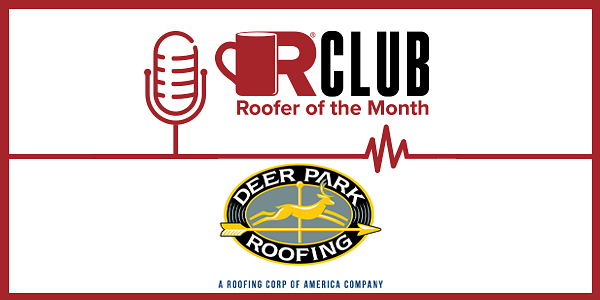
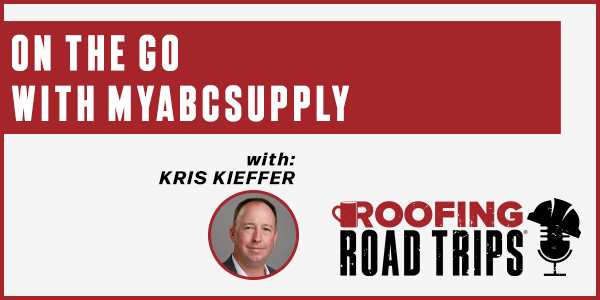



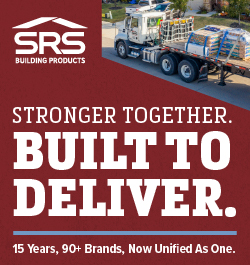
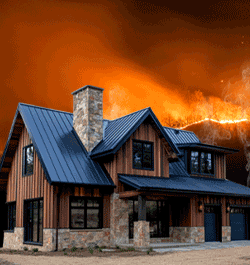
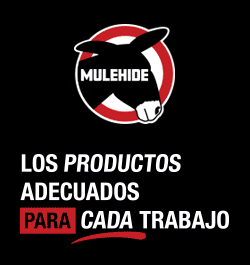
Comments
Leave a Reply
Have an account? Login to leave a comment!
Sign In